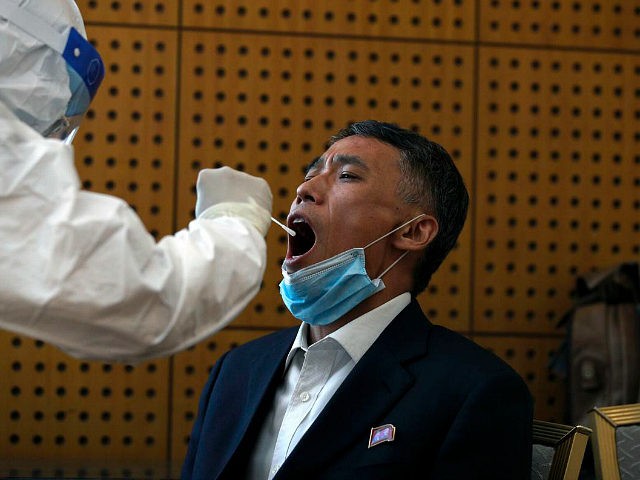Health authorities in China’s northwestern territory of Xinjiang said on Sunday that they detected 138 new asymptomatic cases of coronavirus over the past 24 hours in Shufu county.
Xinjiang is home to over 1,000 concentration camps housing at least one million people, most of them Muslims of Uyghur, Kazakh, and Kyrgyz descent. The Communist Party has not made public any contingency plans to contain a coronavirus outbreak in a concentration camp, as it denies their existence entirely, insisting Xinjiang is only home to “vocational training” camps for underprivileged people.
The deputy head of the Xinjiang health committee, Gu Yingsu, reportedly said that all 137 new cases recorded on Sunday in Kashgar (or Kashi) Prefecture have been linked to a 17-year-old girl who works in a clothing factory in Shufu county, located in Kashgar. Authorities confirmed the teenager’s coronavirus case on Saturday.
According to the report, the teenager was found to be infected with an asymptomatic case of coronavirus during a routine health screening. All 137 cases recorded on Sunday were also asymptomatic.
Kashgar health authorities “said the 17-year-old worked in a different factory … [than her parents] and returned home [to her parents’ neighboring village] once every two weeks.”
All 831 other workers at the girl’s factory in Shufu tested negative for coronavirus, according to the report.
The 137 new cases recorded on Sunday were all “related to a factory in a neighboring village where the girl’s parents worked,” Gu explained, according to the South China Morning Post (SCMP). Despite this, the girl’s parents and brother tested negative for coronavirus.
Kashgar’s coronavirus outbreak is the largest Chinese officials have admitted to since June when health authorities detected a cluster of infections in Beijing they linked to a local food market. The outbreak is also Xinjiang’s latest; it comes three months after health authorities in the territory’s capital, Urumqi, recorded a cluster of cases in mid-July.
In response to the region’s latest outbreak, Kashgar’s capital, Kashgar city, is now “running citywide tests and is hoping to test the entire city population of 4.7 million by Tuesday,” China’s state-run Global Times reported on Monday.
Kashgar’s capital has also “initiated Emergency Response Level 1,” according to Xinjiang officials. The response level empowers the local government to suspend large gatherings, school classes, and other group activities.
“Kashi acted fast on reporting result[s] of the epidemiological survey, it also swiftly adopted strict measures to seal off residential compounds,” according to the newspaper.
The source of infection for the teenager’s coronavirus case remains unknown. The girl “has been in Shufu county the entire year, and has not knowingly been in contact with any confirmed or suspected COVID-19 [Chinese coronavirus] cases, nor has she been in contact with fever patients or wild animals,” the Xinjiang health commission said.
“[A]s asymptomatic infections are still contagious, and the local patient zero has not been found, the risk of a community cluster infection is very high,” Shanghai-based immunologist Wang Ying told the Global Times on Sunday.
“The urgent task now is to study the contact history of 138 people in detail, to learn how the transmission chain formed and find the source. The process can be completed as quickly as a week [sic],” Wang claimed.
The Communist Party secretary of Xinjiang, Chen Quanguo, visited Shufu county and Kashgar on Sunday afternoon.
“Chen said Kashi will try to win the battle against the novel [Chinese] coronavirus and safeguard the lives and health of members of all ethnic groups. He required all-out efforts in tracking down the close contacts of infected people,” the Global Times reported.
Kashgar is “home to 283,000 people. It is a multi-ethnic settlement county composed mainly of Uygurs and 13 other ethnic groups including Han, Kirgiz, and Tajik,” according to the report. Kyrgyzstan and Tajikistan neighbor Xinjiang, home to China’s oppressed ethnic Uyghur minority. The largely Muslim, Turkic-speaking Uyghurs often refer to their native region as “East Turkistan.”
“In Kashi, people share the habit of close social gathering,” Zhang Yuexin, a medical expert leading Xinjiang’s anti-epidemic group, told the Global Times on Sunday.
This local cultural tendency to gather “may boost virus transmissions among all walks of life,” Zhang claimed.
“Citywide tests will help track more potential infections among communities,” he added.

COMMENTS
Please let us know if you're having issues with commenting.